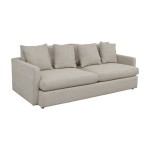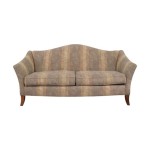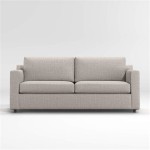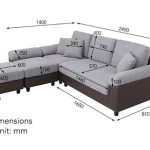Covering a Leather Sofa with Fabric: A Comprehensive Guide
Leather sofas offer a classic, sophisticated look, but their upkeep can be demanding, and the material may not suit all climates or personal preferences. Covering a leather sofa with fabric provides a practical solution for updating its appearance, protecting the leather, and enhancing comfort. This process requires careful planning and execution to achieve a desirable outcome.
Key Considerations Before Starting
Several factors should be considered before embarking on this project. Addressing these points will ensure a smoother process and a more satisfactory result.
1.
Sofa Condition:
Assess the current condition of the leather. Rips, tears, or significant wear should be addressed before covering. Cleaning the leather thoroughly is essential to remove dirt and oils that could hinder the adherence of the fabric cover.2.
Fabric Choice:
The fabric selected plays a crucial role in the final look and feel. Consider durability, color, pattern, and texture. Heavy-duty fabrics like canvas or denim offer durability, while softer materials like velvet or chenille provide a plush feel.3.
Measurement Accuracy:
Precise measurements are paramount for a well-fitting cover. Measure the height, width, depth, and length of each section of the sofa meticulously. Include extra inches for seam allowances and tucking.Methods for Covering a Leather Sofa
Several methods can be employed to cover a leather sofa, each offering varying levels of complexity and customization.
1.
Slipcovers:
Ready-made or custom-made slipcovers offer the easiest and quickest solution. They provide a removable and washable cover, ideal for protecting the leather and changing the sofa's appearance seasonally.2.
Loose Covers (Throws and Blankets):
For a less permanent solution, strategically placed throws and blankets can provide coverage and style. While this doesn't offer a tailored look, it allows for easy changes and cleaning.3.
Upholstery:
This method involves directly stapling fabric to the sofa frame, requiring more advanced skills and tools. While more complex, it offers the most customized and fitted result.Gathering Necessary Materials and Tools
Having the correct materials and tools readily available will streamline the covering process. These items will vary depending on the chosen method.
1.
Fabric:
The chosen fabric should be sufficient to cover the entire sofa, with extra for seam allowances and potential mistakes.2.
Measuring Tape:
Accurate measurements are crucial for a well-fitting cover.3.
Scissors:
Sharp fabric scissors are essential for clean cuts.4.
Sewing Machine (Optional):
While a sewing machine can expedite the process, hand-sewing is also feasible.5.
Pins:
Securely hold fabric in place during sewing or adjustments.6.
Staple Gun (For Upholstery):
Necessary for securing fabric directly to the frame.7.
Staples (For Upholstery):
Choose staples appropriate for the frame material.Step-by-Step Guide for Creating a Slipcover
Creating a slipcover offers a balance of customization and ease of execution.
1.
Measure the Sofa:
Carefully measure every section of the sofa, noting down the dimensions accurately.2.
Create a Pattern:
Use the measurements to create a pattern on paper or directly on the fabric. Consider seam allowances when cutting.3.
Cut the Fabric:
Cut the fabric according to the pattern, ensuring clean and precise cuts.4.
Pin and Sew:
Pin the fabric pieces together, ensuring they align correctly. Sew along the pinned edges, creating the slipcover shape.5.
Fit and Adjust:
Place the slipcover on the sofa and make any necessary adjustments for a snug fit.Tips for a Successful Outcome
Following these tips can significantly improve the overall outcome of the project.
1.
Ironing:
Ironing the fabric before cutting and sewing will ensure a smoother, more professional finish.2.
Seam Finishing:
Use a serger or zigzag stitch to finish seam edges, preventing fraying and improving durability.3.
Tucking and Adjustments:
Take the time to tuck and adjust the fabric for a smooth, wrinkle-free appearance.Maintaining the Fabric Cover
Proper maintenance will prolong the life of the fabric cover and maintain its appearance.
1.
Regular Cleaning:
Vacuuming the cover regularly will remove dust and debris. Follow the fabric care instructions for washing or spot cleaning.2.
Protection from Sunlight:
Prolonged exposure to sunlight can fade the fabric color. Consider using window coverings or positioning the sofa away from direct sunlight.Alternatives to Fabric Covers
If covering the entire sofa seems daunting, consider alternative solutions.
1.
Seat Cushions Covers:
Replacing or covering just the seat cushions can provide a refreshed look with less effort.2.
Armrest Covers:
Protect armrests from wear and tear with specifically designed covers.
Recover Your Sofa From Leather To Fabric Stunning Transformation And A Lot Er Than New Rescot Upholstery
:max_bytes(150000):strip_icc()/9CraftingNook-499f3378b698461cb206f172f76a9286.jpg?strip=all)
20 Diy Couch Cover Ideas For Any Budget
:max_bytes(150000):strip_icc()/2RobbRestyle-9da508c4528645d3908f39db224c4086.jpg?strip=all)
20 Diy Couch Cover Ideas For Any Budget

8 Stylish Sofa Cover Ideas To Protect Your Furniture Home Made By Carmona

Decorating With Leather Furniture 3 Tips You Ve Gotta Know Nell Hill S

How To Mix Leather And Fabric Furniture

Decorating With Leather Furniture 3 Tips You Ve Gotta Know Nell Hill S

Leather Vs Fabric Sofa Which Is The Better Choice

How To Mix Leather And Fabric Furniture

9 Best Protectve Couch Covers And Sofa Slipcovers 2024








